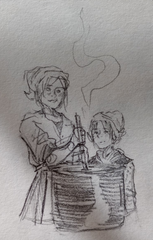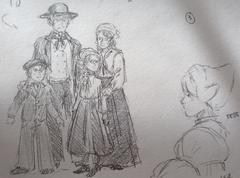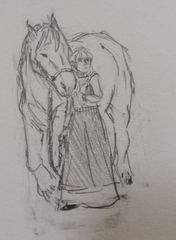Your cart is empty now.

Eavesdropping
The Netherlands – Summer, 1846
Sunday morning, I dress for church and braid my hair. I’m still worried Uncle Ed might have talked Father and Mother into going to church in Wittemeer. At breakfast, I pray that God will help them know which church to go to. And that it will be the one in Otten.
Either way, my Sunday outfit is a disappointment. I’ve been growing out of it for months. Mother promised to make me a new Sunday dress from cloth she bought this spring. It will be yellow, like an early ear of corn, with blue buttons. But it isn’t finished yet.
After breakfast, Father leads us out into the lane and turns toward Otten. What a relief. A normal Sunday. At my own church. With all my friends.
The day is warm. Wheat fields shimmer in the sunlight. Starlings swirl overhead. We walk in the grass at the edge of the lane to avoid kicking up dust.
Father tells Mother, “Don’t wait for me after church. I have to stay for a bit.”
She nods that she understands.
I understand too. He’s staying to talk with Rev. Bloem and the elders. I get permission to stay after church, too, and walk home with Father. More time to spend with my friends.
Knowing what Uncle Ed is trying to do, I decide to say something nice about our church. “I just love the way the church bell tower soars over the whole town. It’s very majestic.”
“What’s ’jestic?” Luc asks.
“Stately,” I say.
“What’s stately?”
“Stuffy,” Theo says. “That means it’s too hot in the summertime.”
“Oh.”
Father chuckles. “And too cold in the winter. I can’t argue with that.”
“With hard benches in all seasons,” Theo adds.
Even Mother laughs.
Theo! Why does he have to be so ignorant?
I try again. “It’s pretty, though. The stone steps and high windows. And in the morning, the sun turns the brick all orange and gold.”
Father isn’t even paying attention. He holds his songbook in one hand and struggles to keep hold of Luc with the other.
It doesn’t matter. He’ll talk to Rev. Bloem and the elders. They’ll make everything right.
A half hour walk brings us to Otten. We cross the canal using the White Bridge. The sections nearest the banks are made of brick, as orange as the royal crest. The section in the middle is wood and painted pure white, like a stork’s head and shoulders. And it’s a drawbridge, so the middle can be raised to let tall boats through and lowered to let people cross over.
Church members fill the streets—old men walking with canes, young fathers and mothers carrying babies, sisters holding hands. I glance at Theo, who’s scratching his belly. If only I had a sister.
***
After the service, Father heads downstairs quickly to catch the elders. I take a moment longer to help Mother with Luc, then find my way to the stairs.
As soon as I reach the lower level of the church, I hear voices coming from the elders’ meeting room. Rev. Bloem says, “I urge our members to love their neighbor. Even unbelievers. I think that’s important.”
“That is important,” Father says, “but it can’t replace the gospel. We’re sinners. We need to hear about forgiveness, about God’s grace.”
Rev. Bloem starts to respond, but Mr. Jonkeer interrupts. “You sound like an ignorant peasant, Theodore. I want to think better of you.”
“I do talk about Jesus,” Rev. Bloem says. “I try to bring him into my sermon each week.”
“But not the cross. Not that he’s the son of God come to save us from our sins. Only what a good example he was.”
“He was a good example.”
“You can’t cling to old ideas, Theodore.” Mr. Jonkeer speaks impatiently, as if to a child. “We have a new message. A message for today.”
“We need the gospel today.”
“Times change. We have to change too. Have you even heard of the Enlightenment? We don’t want to be thought of as ignorant. Uneducated.”
“Education doesn’t conflict with the gospel,” Father says. “Not if it’s proper education. The truth doesn’t change.”
“I’ll tell you the truth.” Mr. Jonkeer is angry now. “Your brother Ed is a troublemaker. We hoped you’d be more reasonable.”
A footstep sounds behind me and a voice whispers, “You shouldn’t listen in when the elders are meeting.”
Startled, I turn around. There stands Xander Bloem. He drags a hand through his mop of yellow hair. “That’s supposed to be private.”
“Well…you shouldn’t race around before church. You…” I turn and march across the room and up the stairs.
He follows me. “What are they talking about?”
“It’s private.”
“Come on.”
“I don’t know.”
“Yes, you do. And so do I.”
I spin around and face him. “Tell me, if you know so much.”
“Your uncle wants to start one of those new churches. He wants your family to join him.”
“You don’t know what you’re talking about.”
“I do. I heard Mr. Jonkeer telling my father. He says your uncle is the problem. Your father is just going along.”
“You shouldn’t…” I want to accuse him of listening in but stop short. Tears threaten, but I will them to stop.
He steps closer, but I jerk away. If he puts a hand on my shoulder, if he says one thing, I’ll have to punch him.
Footsteps sound on the stairs below. I wipe my face with my sleeve. A moment later, Father appears. “Hello, Xander. Hi, Tess.”
“Hello,” mumbles Xander.
We walk out of church. Xander turns one way. Father and I turn the other.
All the way home, I wait for Father to bring up his talk with Rev. Bloem and the elders. He doesn’t say a word.
That leaves me to wonder. Is it true what they said? Is Uncle Ed a troublemaker? Is Father just going along? And if so, how can I help him to be more reasonable?
***
Back at home, I raid Mother’s sewing basket for scraps of colored cloth and resume work on a rag doll, a present for Julia’s mother’s soon-to-be baby. I dress her in blue gingham, with long yellow yarn for hair. She’s very pretty. I call her Lizbet.
Theo knocks on my door, which is half open. He looks around my room. “What a mess.”
See what I mean? Rude. Not that he’s wrong. Last year’s school supplies are piled in one corner, yesterday’s clothes in another.
He notices Lizbet. “What’s with the doll?”
“It’s for Mrs. Jonkeer’s new baby. What do you want?”
“Nothing. Mother wants you in the kitchen.”
He turns to go, but I stop him. “Do you think Uncle Ed is a troublemaker?”
“What? No. Why would you say that?”
“Mr. Jonkeer thinks he is. Because he wants to start one of those new churches.”
“How do you know what Mr. Jonkeer thinks?”
“I…Never mind that. He just does.”
“So?”
“It just makes me wonder. Why are they starting new churches? I wish I knew more about them.”
“Me too.” He lowers his voice. “I did hear one thing, though.”
“What?”
“Some of them are talking about leaving the Netherlands. Going to America.”
“Leaving the Netherlands? That just proves they’re wrong.”
“Not necessarily.”
“Yes. Necessarily.”
He disagrees. “The government put their ministers in prison. Elders and deacons too.”
“That proves they’re bad. The government wouldn’t put good ministers in prison.”
“Ha! Don’t be ignorant.”
I glare at him. That’s hard to take—being called ignorant by Theo.
He doesn’t seem to notice my glare. “In America they don’t put ministers in prison.”
“I don’t care.”
“America has lots of land. If someone is strong and willing to work, they can earn enough to buy their own land. Father could be like Mr. Borgman.”
“Mr. Borgman is old and fat. And he has bushy eyebrows.”
“And he’s rich.”
“Who wants to be rich? I don’t. I’ll never leave the Netherlands.”
Theo sighs. “Father won’t either. But I might.”
“Theo! How could you?”
“I’m tired of rich people looking down on us. They walk around like they own everything. They wear expensive clothes and get the best houses. Even in church, they get the best seats, and we have to take whatever is left.”
“Who cares about that? I love our farm.”
“It isn’t even our farm. Our house isn’t even our house. It all belongs to Mr. Borgman. Father works all day, worries about the weather, prays for a good harvest, and Mr. Borgman is the one who gets rich.”
“Father doesn’t complain.”
Theo snorts in frustration. “Maybe he should.”
I don’t want to hear any more about it. I take my doll and head to the kitchen to find Mother.
She’s adding potatoes to a stewpot. We grow potatoes in a large plot beyond the canal and eat them with every meal. She smiles when she sees Lizbet. “How pretty.”
“She’s for the Jonkeers’ new baby. I’m going to give her to Julia at church tonight.”
“Oh.” Mother glances at Father.
He rises stiffly from his chair and puts a hand on my shoulder. “Let’s go for a walk.”
This can’t be good. The last time Father suggested we go for a walk, I was eight years old, and he told me Grandmother had died.
Outside, the afternoon air feels thick and heavy. The grass bends over with the weight of it. Father waits until we’re well down the lane, then says, “We’ve decided not to go to church in Otten tonight.”
“We can’t not go to church.”
“Of course. We’re going to visit the new church in Wittemeer.”
“But you told Uncle Ed—”
“I know. But I spoke with Rev. Bloem and the elders this morning. They’re not going to change.”
I can see that he’s not going to change either. But I have questions. “Does the church in Wittemeer meet in a barn? With cows?”
He chuckles. “They have a building. No cows in church.”
“Will Betsie be there?”
“Yes.”
“And the Huizens?”
“Not the Huizens. But the Kosters will come. And the Vissers.”
“And the Jonkeers? Will Julia be there?”
“No.”
“Nellie?”
He kneels down, putting his face close to mine. “None of your other friends will be there. But the truth of God’s word will be there. And that’s the important thing.”
I nod like I understand. But when we return home, I shut myself in my room. Not because I’m crying. I’m not crying. I just want to be alone. I sit on my bed and hold Lizbet on my lap. I tell her what I can’t tell Father. “Friends are important too. They’re important to me.”
You've just finished a sample chapter of In Times of Trouble, a new book by author P.M. Kuiper. Perfect for ages 12 to 16, this book is written from the perspective of 13-year-old Tess, a young Dutchwoman experiencing religious persecution during the Afscheiding of the 1800s.
Interested in what you just read? You can order a copy of the book here or by clicking the image above. Or visit Challies.com on Friday, June 6, 2025, to enter your name in a giveaway and win 1 of 10 free copies!
Subscribe to the Reformed Free Publishing Association email list to be notified of sales, news, and upcoming children's book releases.
The content of the article above is the sole responsibility of the article author. This article does not necessarily reflect the opinions and beliefs of the Reformed Free Publishing staff or Association, and the article author does not speak for the RFPA.

Donate
Your contributions make it possible for us to reach Christians in more markets and more lands around the world than ever before.
Select Frequency
Enter Amount



